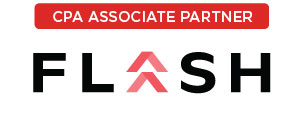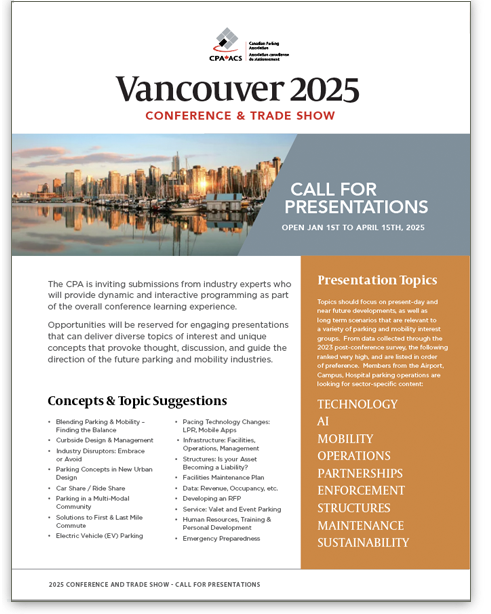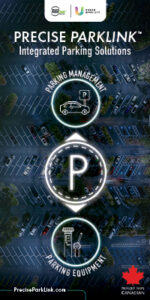Rideshare Technology – no longer just for carpools
By Sharon Lewinson
A glimpse into what is happening now & what the future may hold for Accelerating Innovative Parking Strategies
Online rideshare matching started out over ten years ago as a mechanism to help people find carpool partners. They were launched by a few of the most forward thinking municipalities and private sector companies to help their residents or employees choose an alternative to driving alone.
Fast forward a decade and everything has changed. The internet and associated rapid technology advances, along with private and public sector demand (mostly south of the border), have resulted in a few of these systems being fully integrated multimodal transportation portals – and they include parking!
Streamlined integration with a multimodal focus are the fundamental elements that have resulted in the increased effectiveness of these rideshare systems and their growing use worldwide. Understanding how parking stakeholders can use or integrate with this technology can be a vital business strategy for parking organizations. A glimpse into the state of rideshare technology today and where it’s going might help you with your business decisions or open up opportunities for collaboration and engagement with other transportation stakeholders.
What are the high level components included in an online rideshare system today?
While there are many hosted rideshare systems on the market, there are really only a very small few who can provide the enterprise level services demanded from cities and organizations today.
Multimodal systems include matching for not only carpools, but for bike, walking and transit buddies. They include online transit, bike and walking planners, links to transportation agencies, park & ride lots, shuttle routes, EV charging stations, carpool parking and more. They can be the key online resource offered to the public or employees for transportation or commuting information.
Other key attributes:
- In general the core functionality of rideshare matching is also available in a mobile version (aka an ‘app’) for handheld devices.
- The online website is secure, hosted and provides a unique URL for each client
(best practice). - Private sector organizations or universities/colleges often offer closed systems with single sign on authentication.
Who buys rideshare systems and why?
There are two primary purchasers of these systems – public sector (city, regional level) and private sector (employers or universities/colleges). Each launch a rideshare system in response to their unique challenges or needs:
Public sector: Canadian cities are facing a new transportation reality
- Insufficient money, land and public support to meet future needs by road-building
- Air quality, climate change, energy conservation, congestion are major public issues
- Maximize the return and efficiency on smart infrastructure investments
- Physical inactivity/obesity
- Government leadership critical
Inclusion of Sustainable Mobility strategies can:
- Make today’s infrastructure more efficient
- Make new infrastructure investments more successful (e.g. transit improvements)
- Help resolve short-term traffic issues, such as during major construction projects
- Slow congestion growth, and even reverse it
Private sector: Private sector companies are often facing parking demand issues, consolidation/expansion or desire to improve their sustainability portfolio. Launching a commuter options program includes the provision of access to an online rideshare system, or in the case of most organizations, the online rideshare system becomes their commuter portal. Benefits include:
- Improved employee health
- Increased productivity
- Reduced parking requirements & associated cost savings
- Improved employee satisfaction
- Access to employees through improved transportation options
- Improved corporate social responsibility (CSR)
- Response to mandates (more common in the USA)
- More competitive cities attract more new businesses
The specific ‘department’ that is involved in the purchasing decision is usually transportation, TDM or transit in the public sector and the parking, TDM or facility management in the private sector or university/college setting. Most commonly it tends to come down to one or two forward-thinking individuals who are the leading innovators in their organization who pursue and manage the rideshare system.
Mobility Management System
Mobility Management System
Full mobility or commute management portals offer integrated functionality. Online rideshare sites can offer all the following functionality through a single login – everything is integrated and intelligent logic ‘remembers’ addresses, preferences and history.
Core Rideshare Matching
Find carpool partners or bike, walking and transit buddies. Searches are filtered by proximity to origin, destination, travel route, travel schedule and personal preferences (gender, smoker, driver/passenger), student/staff separation, etc.
Single Trip Matching
Find carpool partners for one-off trips based on the core rideshare searching criteria, allowing for ‘instant or dynamic’ matches by geocoding location.
Custom Sub-sites
Cities or organizations can launch one high level site with distinct and separately branded sub-sites within the same database.
Used in state-wide or city systems to allow for uniquely branded regional or employer sites, and by organizations who have locations throughout North America or globally, each sub-site can include location-specific information and be geocoded to a centroid in that specific location.
Social Network Integration
Allows for Facebook login and the posting of information to social networking sites by users (e.g. posting of “I cycled to work today and saved 32 kg of greenhouse gas emissions).
Trip Logging Calendar
The most used feature on these websites is user logging of their sustainable trips. The system automatically calculates emission, health and cost benefit savings. The trip calendar is often (particularly in the USA) linked to incentives.
Incentive Management
People logging sustainable trips qualify for incentives. Incentive management can be quite complex or straightforward. Some cities encourage users to log their sustainable trips and then offer random draws for national or local retailers. Organizations often go one step further and enhance the system to link in with AMEX, Visa or other reward cards (or cash). The level of incentives offered typically is dependent upon the problem that the system was launched to address (e.g. congestion, parking demand/supply, compliance, etc.). When parking demand is a critical factor significant incentives can be offered to offset or delay the construction new parking infrastructure.
Carpool Parking Management
Supporting sustainable travel choices includes the provision of priority carpool parking spaces. The system will let people register their carpool group and vehicles in order for the organization to distribute carpool parking hangtags.
Priority carpool parking is used by private sector employers for their own parking lots. Nortel was the first in Canada to dedicate almost 15% of their onsite parking for carpoolers.
Priority carpool parking can also be offered through the system for public park and ride lots.
Routing or Points of interest
Systems are now integrating with other database feeds, bringing in park and ride locations, bike share stations, vanpool routes (USA) or other elements that an organization wants to display on a responsive map (users can click, for example, on a park and ride location to set it as their origin or destination).
The integration with other XML data feeds is a hugely significant opportunity for the parking industry.
Carpool Group Management
Some organizations offer cash or other perks besides priority parking to registered carpool groups. This component of the rideshare system allows users to register and validate their carpool group members.
Vanpool Participant Management
In the USA, vanpools are a rapidly increasing service offered by transit authorities, 3rd party vendors or organizations. Rideshare systems provide users with information on relevant vanpool routes and allow them to join or go on a waitlist for this specialty service.
Survey Integration
Monitoring, measurement and reporting on sustainable travel options is a fundamental requirement by all organizations. The inclusion of surveys embedded in the rideshare system allows administrators to better market and promote sustainable transportation services. >
Parking Space Finder
In line with the new sharing economy, the integrated parking space finder allows people or parking lot providers to post available private parking spaces for rent. Users can search based on proximity to their desired origin/destination.
Of interest, the private parking space finder application is used by cities that experience challenges with on-street parking during winter snow clearing. The private parking space finder makes use of available parking in the community to get these vehicles off the road for snow clearing.
Emergency Ride Home
Organizations encouraging sustainable commute options support their use by offering a guaranteed ride home in case of emergencies (unscheduled overtime, carpool partner leaves early, child sick, etc.). The ride share system tracks claims and approvals. Often the use of the emergency ride home module is tied to the commute calendar where only those logging a certain number of sustainable trips qualify.
Commuter Challenge
Challenges help to build engagement and a commuter challenge module that allows for joining teams and provides team rankings is often a critical feature for organizations looking to build engagement and promote sustainable travel options.
School Pool
School pool matching reduces traffic around schools by facilitating carpooling by parents for children going to the same school, helps create walking school buses or bike trains for active transportation promotion
General Info
Finally these ride share sites can now be the single portal into all information related to transportation, parking and sustainable travel choices. The ability for administrators to edit content encourages and supports dynamic websites and helps build awareness and participation. Mobile app’s offer users the ability to use the system while not at their desks. The most common functionality transferred to an app includes the core rideshare matching, single trip matching, trip logging and incentives. And finally, access to data is critical. Enterprise level rideshare systems provide 24/7 data access, exporting, mapping, integrated email, filtering and more.
Existing and Future Opportunities for the parking industry
Significant opportunities exist for parking industry stakeholders to embrace and get on board with rideshare technology for their organization:
Universities/Colleges
If you manage parking at a university or college, launching a rideshare system offers significant benefits (and they are usually managed through the parking department):
- Removing transportation barriers improves campus attractiveness to students;
- improves sustainability portfolio;
- lower parking demands can free up parking lands for new buildings;
- increase parking revenues by reduction of long term parking demand through carpooling (more short term space availability).
Employers
- Providing sustainble commuting options support for employees is now a core benefit (often mandated) for most US employers. It’s coming soon to Canada so act now;
- Employers are already providing priority carpool parking on their own;
- The most relevant opportunity for the parking industry now relates to the registration of carpool groups for priority carpool parking.
Cities/Regions
- The new custom branded rideshare sites with dedicated URLs support Official Plan and Transportation Master Plan growth strategies through increased carpooling, transit, cycling and walking;
- The provision of priority carpool parking at Park and Ride lots is a new and emerging trend;
- If your transportation department has a legacy system that can’t offer the custom branded integrated techology, or your city doesn’t have a multimodal rideshare system, it’s your opportunity
to launch one.
Rideshare systems embrace technology and as most are highly sophisticated database driven applications, there is the opportunity now or in the future to integrate parking data into such a system.
Potential examples include:
- Integrated Parking Space availability – real time parking space availability;
- Parking booking & payment – space booking and online payment;
- Enhanced Private Parking Finder to include Public Spaces;
- And more….
As the parking industry experts, this is your opportunity to explore how you can embrace rideshare technology to help you build your business and better meet the needs of your clients.
RideShark is a Canadian company based in Ottawa with a global client base. It offers fully hosted custom branded SaaS rideshare mobility management solutions to both public and private sector organizations.





